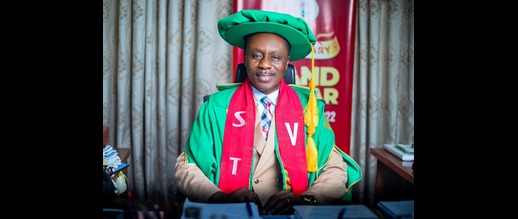The Vice-Chancellor of Sunyani Technical University (STU), Ing. Prof. Kwadwo Adinkrah-Appiah, delivered a compelling address at the 6th Africa Sustainability Report and Think Energy SDGs Awards held on Wednesday, 22 October 2025, at the Coconut Grove Regency Hotel, Accra.
The Vice-Chancellor of Sunyani Technical University (STU), Ing. Prof. Kwadwo Adinkrah-Appiah, has urged African governments, academia, and industry to renew their commitment to advancing the continent’s renewable energy agenda to meet the Sustainable Development Goals (SDGs) by 2030.
Speaking on the theme “A Decade of SDGs in Africa: Resetting our Climate Goals for Agenda 2030,” the Vice-Chancellor emphasized Africa’s urgent need to transition from fossil fuels to renewable energy to mitigate climate change and ensure sustainable growth. Presenting on “Africa’s Renewable Energy Journey: A Decade of SDGs in Action,” he highlighted that renewable energy is vital for reliable power, industrialization, and environmental protection.
He highlighted Africa’s progress in renewable energy, noting that the continent has witnessed significant investments in solar, wind, and geothermal power, citing examples such as Morocco’s Noor Solar Complex and Kenya’s Lake Turkana Wind Farm. However, he emphasized that Africa still contributes less than 2% of global renewable energy capacity, underscoring the need for policy reforms, public-private partnerships, and stronger political commitment.
The STU Vice-Chancellor proposed six key strategies to accelerate the energy transition, including comprehensive renewable energy policies, inclusivity in development, increased funding, and a more active role for universities in research and capacity building.
He reaffirmed that institutions like Sunyani Technical University remain pivotal in training the next generation of engineers, technicians, and innovators to drive Africa’s green transformation.
Ing. Prof. Adinkrah-Appiah concluded by urging stakeholders to “reset Africa’s renewable energy journey” to meet Agenda 2030, stating that Africa must choose the path of sustainability, innovation, and shared prosperity for future generations.

